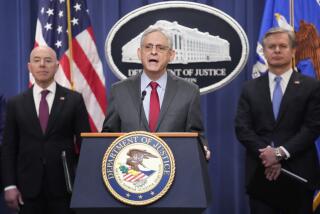State Department announces sanctions on 33, including Russians charged with meddling in 2016 U.S. election
The Trump administration on Thursday imposed sanctions on 33 foreign individuals and businesses, including at least 25 Russian nationals previously indicted by special counsel Robert S. Mueller III on charges of interfering with the 2016 U.S. presidential campaign.
The sanctions, announced by the State Department, are the latest sign of the discordant U.S. policy toward Moscow, with President Trump repeatedly praising Russian President Vladimir Putin while other parts of the administration move to crack down on Russian abuses.
The latest list means 72 Russians have been sanctioned since Trump took office last year. In March, the administration also expelled 60 Russian diplomats, who it said were spies, in retaliation for the nerve agent attack on a former Russian spy living in England.
The State Department said those named Thursday were “a part of, or operating for or on behalf of, the defense or intelligence sectors” of the Russian government. A division of the Chinese military also was blacklisted for buying Russian weaponry.
The target list also included several Russian individuals and entities that the State Department says played a role in Russia’s 2014 invasion of neighboring Ukraine and its seizure of Crimea.
The sanctions are “in direct response to Russia’s aggressive actions against our country, our allies and our partners,” said a State Department official who briefed reporters on condition of anonymity in keeping with department rules.
The list includes 12 Russians who were indicted by a federal grand jury in July for the hacking of the Democratic National Committee and Hillary Clinton’s presidential campaign in 2016. The Russians were identified as military intelligence officers in the indictment, which was handed down three days before Trump met with Putin in Helsinki, Finland.
The list also includes 13 other Russians who where indicted in February on charges of misusing social media in attempt to spread disinformation during the campaign.
The sanctions freeze any financial assets the targets have in U.S. banks or institutions, and bar Americans from doing business with them. It wasn’t immediately clear those named had any such assets or businesses, so the impact is likely to be more symbolic that substantive.
The Chinese military entity was identified as the Equipment Development Department, the division responsible for weapons and equipment. Its director, Li Shangfu, was also blacklisted for conducting “significant transactions” with a leading Russia arms exporter, the State Department said.
At issue were Chinese purchases of 10 Su-35 fighter planes in 2017 and equipment for S-400 surface-to-air missile systems in 2018.
The State Department official said the goal was to punish Moscow, not Beijing, to prevent Russia from profiting from its arms industry.
The Russian government has routinely dismissed U.S. sanctions as senseless and ineffective. Putin said in Helsinki that he wanted Trump to win the 2016 election, in part to gain relief from sanctions.
For more on international affairs, follow @TracyKWilkinson on Twitter
UPDATES:
5:17 p.m.: This article has been updated with a new total of the number of previously indicted Russians now facing sanctions.
This article was originally published at 4:20 p.m.
More to Read
Start your day right
Sign up for Essential California for news, features and recommendations from the L.A. Times and beyond in your inbox six days a week.
You may occasionally receive promotional content from the Los Angeles Times.







